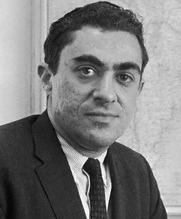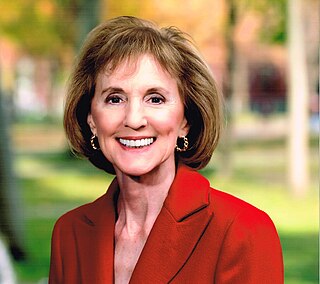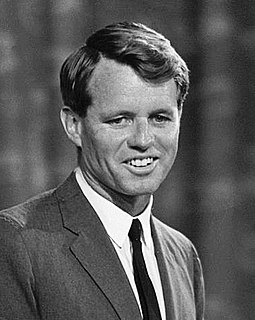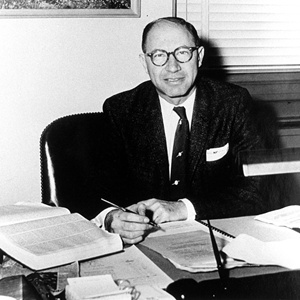
Arthur Meier Schlesinger Jr. was an American historian, social critic, and public intellectual. The son of the influential historian Arthur M. Schlesinger Sr. and a specialist in American history, much of Schlesinger's work explored the history of 20th-century American liberalism. In particular, his work focused on leaders such as Harry S. Truman, Franklin D. Roosevelt, John F. Kennedy, and Robert F. Kennedy. In the 1952 and 1956 presidential campaigns, he was a primary speechwriter and adviser to the Democratic presidential nominee, Adlai Stevenson II. Schlesinger served as special assistant and "court historian" to President Kennedy from 1961 to 1963. He wrote a detailed account of the Kennedy administration, from the 1960 presidential campaign to the president's state funeral, titled A Thousand Days: John F. Kennedy in the White House, which won the 1966 Pulitzer Prize for Biography or Autobiography.

Theodore Chaikin Sorensen was an American lawyer, writer, and presidential adviser. He was a speechwriter for President John F. Kennedy, as well as one of his closest advisers. President Kennedy once called him his "intellectual blood bank".

The Conscience of a Conservative is a 1960 book published under the name of Arizona Senator Barry Goldwater who was the 1964 Republican presidential candidate. It revived the American conservative movement, made Goldwater a political star, and has influenced countless conservatives in the United States, helping to lay the foundation for the Reagan Revolution of the 1980s.
John Morton Blum was an American historian, active from 1948 to 1991. He was a specialist in 20th-century American political history, and was a senior advisor to Yale officials.

In political studies, surveys have been conducted in order to construct historical rankings of the success of individuals who have served as the president of the United States. Ranking systems are usually based on surveys of academic historians and political scientists or popular opinion. The rankings focus on presidential achievements, leadership qualities, failures, and faults.
A speechwriter is a person who is hired to prepare and write speeches that will be delivered by another person. Speechwriters are employed by many senior-level elected officials and executives in the government and private sectors. They can also be employed to write for weddings and other social occasions.

Richard Naradof Goodwin was an American writer and presidential advisor. He was an aide and speechwriter to Presidents John F. Kennedy and Lyndon B. Johnson, and to Senator Robert F. Kennedy.
James MacGregor Burns was an American historian and political scientist, presidential biographer, and authority on leadership studies. He was the Woodrow Wilson Professor of Government Emeritus at Williams College and Distinguished Leadership Scholar at the James MacGregor Burns Academy of Leadership of the School of Public Policy at the University of Maryland, College Park. In 1971 Burns received the Pulitzer Prize and the National Book Award in History and Biography for his work on America's 32nd president, Roosevelt: The Soldier of Freedom.

Modern liberalism in the United States is the dominant version of liberalism in the United States. It combines ideas of civil liberty and equality with support for social justice and a mixed economy. According to Ian Adams, all American parties are "liberal and always have been. They reportedly espouse classical liberalism, that is a form of democratized Whig constitutionalism plus the free market. The point of difference comes with the influence of social liberalism".
The Judson Welliver Society is a bipartisan social club composed exclusively of former presidential speechwriters in the United States. The group is named after Judson C. Welliver, the "literary clerk" to President Warren Harding, usually credited as being the first presidential speechwriter. Group meetings are usually held after major presidential speeches, such as the State of the Union. Active members have included William Safire, Jack Valenti who was a veteran of the Johnson administration, Pat Buchanan, David Gergen, Tony Snow, Michael Waldman (Clinton), George Stephanopoulos (Clinton), James Fallows (Carter), Chris Matthews (Carter), Hendrik Hertzberg (Carter), Anthony R. Dolan (Reagan), Michael Gerson, and Clark Clifford, who wrote speeches for Harry Truman.

Gillian Sorensen is the former United Nations Assistant Secretary-General for External Relations. Sorensen currently works with groups and organizations committed to peace, justice, development, refugees, and human rights. She recently addressed the National Model United Nations (NMUN), attended by students from over 130 countries.
The Century Foundation is a progressive think tank headquartered in New York City with an office in Washington, D.C. It was founded as a nonprofit public policy research institution on the belief that the prosperity and security of the United States depends on a mix of effective government, open democracy, and free markets. Its staff, fellows, and authors produce books, reports, papers, pamphlets, and online publications. The Foundation also hosts policy-related events and workshops for various audiences, including policy experts, journalists, college students and other academics, and the general public. It also manages several ongoing policy projects and operates a number of websites on various policy-related topics.
Robert Schlesinger is an American writer and liberal commentator focusing on politics and political communications.
Stephen C. Schlesinger is an American author, political commentator, and international affairs specialist. He is a Fellow at the Century Foundation in New York City. He served as Director of the World Policy Institute at the New School University from 1997 to 2006. He was foreign policy advisor to New York State Governor Mario Cuomo during his three terms in office.

Robert Francis Kennedy, sometimes referred to by the initials RFK and occasionally Bobby, was an American politician and lawyer who served as the 64th United States Attorney General from January 1961 to September 1964, and as a U.S. Senator from New York from January 1965 until his assassination in June 1968. He was, like his brothers John and Edward, a prominent member of the Democratic Party and has come to be viewed by some historians as an icon of modern American liberalism.

The Report to the American People on Civil Rights was a speech on civil rights, delivered on radio and television by United States President John F. Kennedy from the Oval Office on June 11, 1963 in which he proposed legislation that would later become the Civil Rights Act of 1964. Expressing civil rights as a moral issue, Kennedy moved past his previous appeals to legality and asserted that the pursuit of racial equality was a just cause. The address signified a shift in his administration's policy towards strong support of the civil rights movement and played a significant role in shaping his legacy as a proponent of civil rights.

The American University speech, titled "A Strategy of Peace", was a commencement address delivered by United States President John F. Kennedy at the American University in Washington, D.C., on Monday, June 10, 1963. Delivered at the height of his rhetorical powers and widely considered one of his most powerful speeches, Kennedy not only outlined a plan to curb nuclear arms, but also "laid out a hopeful, yet realistic route for world peace at a time when the U.S. and Soviet Union faced the potential for an escalating nuclear arms race." In the speech, Kennedy announced his agreement to negotiations "toward early agreement on a comprehensive test ban treaty" and also announced, for the purpose of showing "good faith and solemn convictions", his decision to unilaterally suspend all U.S. atmospheric testing of nuclear weapons as long as all other nations would do the same. Noteworthy are his comments that the United States was seeking a goal of "complete disarmament" of nuclear weapons and his vow that America "will never start a war". The speech was unusual in its peaceful outreach to the Soviet Union at the height of the Cold War, and is remembered as one of Kennedy's finest and most important speeches.

The Yale Political Union (YPU) is a debate society at Yale University, founded in 1934 by Professor Alfred Whitney Griswold. It was modeled on the Cambridge Union and Oxford Union and the party system of the defunct Yale Unions of the late nineteenth and early twentieth centuries, which were in turn inspired by the great literary debating societies of Linonia and Brothers in Unity. Members of the YPU have reciprocal rights at sister societies in England. The Union is the central forum for political discussion and activism at Yale, and was Yale's largest student organization.

Myer Feldman, known as Mike Feldman was an American political aide in the Kennedy and Johnson administrations. Hailing from Philadelphia, Feldman was a trained lawyer and alumnus of the University of Pennsylvania, which he attended on a scholarship. He served in the Army Air Force during the Second World War prior to joining Kennedy's campaign trail in 1957.
Alan Louis Sagner was an American Democratic Party politician, businessman and philanthropist who served as New Jersey Commissioner of Transportation, as Chairman of the Port Authority of New York and New Jersey, and as Chairman of the Corporation for Public Broadcasting.











